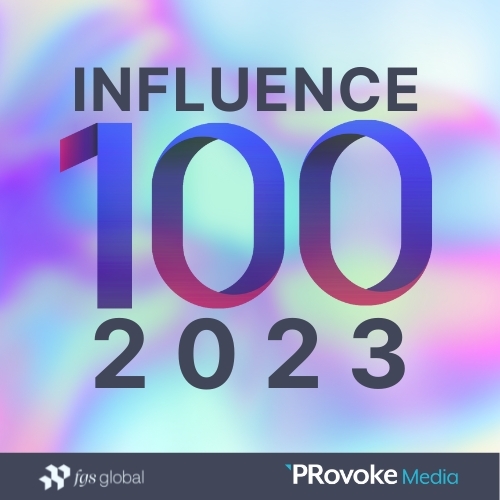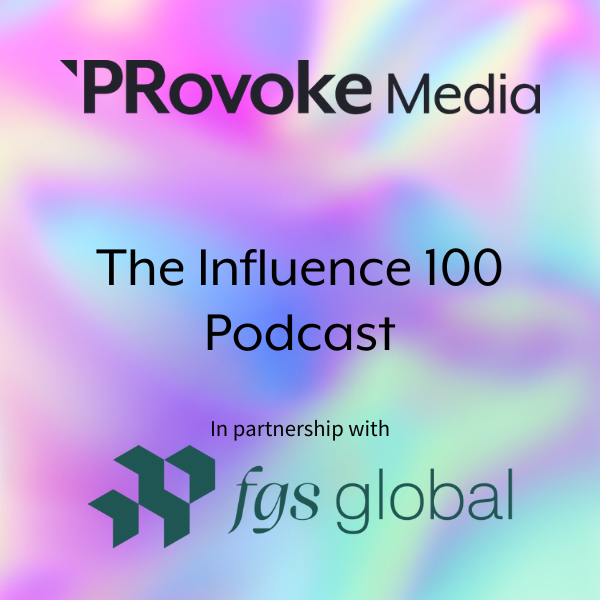
 Podcasts
PodcastsCatch the latest PR news & updates with PRovoke Media's PR Podcasts. Lifting the lid on key industry stories & trends, join our listeners of PR podcasts today.
 Videos
VideosLatest video interviews and campaigns from PRovoke Media, previously known as the Holmes Report.
Long-form journalism that analyzes the issues, challenges and opportunities facing the business and practice of PR.
 Profiles & Interviews
Profiles & InterviewsExplore PR profiles and interviews with leaders from the marketing and PR worlds.
 Crisis Review
Crisis ReviewPR Crisis & Business Crisis review. PRovoke Media's annual analysis of the top reputation crises to rock the corporate sector. Read on here.
 Coronavirus
CoronavirusPRovoke Media's coverage of the Covid-19 crisis, focusing on corporate communication, public affairs & PR industry fallout.
 Trend Forecasts
Trend ForecastsPRovoke Media's PR Trends round up. PRovoke Media's annual forecast of PR trends and news that will impact the PR world in the year ahead...
 Social & Digital
Social & DigitalDedicated to exploring the new frontiers of PR as it dives deeper into social media, content and analytics.
 Technology
TechnologyOur coverage of key technology PR trends and challenges from around the world of digital communications.
 Consumer
ConsumerFrom brand marketing to conscious consumerism, coverage of key marketing and PR trends worldwide.
 Employee Engagement
Employee EngagementPRovoke Media's coverage, analysis and news around the rapidly-shifting area of employee engagement and internal communications.
 Sports Marketing
Sports Marketing Sports PR news, diversity & inclusion trends, views and analysis from PRovoke Media. Subscribe today for the very latest in the world of sports communications.
 Global PR Agency Rankings
Global PR Agency RankingsPRovoke Media's definitive global benchmark of global PR agency size and growth.
Enter PRovoke Media's 2024 Global 250 Agency Ranking and/or our Agencies of the Year competitions now.
 Agencies of the Year
Agencies of the YearPRovoke Media's annual selections for PR Agencies of the Year, across all of the world's major markets.
 Innovator 25
Innovator 25PRovoke Media profiles marcomms innovators from across North America, EMEA and Asia-Pac.
 Creativity in PR
Creativity in PRIn-depth annual research into the PR industry's efforts to raise creative standards.
 Asia-Pacific Communication Index
Asia-Pacific Communication IndexAPACD/Ruder Finn annual study of Asia-Pacific in-house communications professionals.
 SABRE Awards
SABRE AwardsThe world's biggest PR awards programme, dedicated to benchmarking the best PR work from across the globe.
 PRovokeSummit Global
PRovokeSummit GlobalThe biggest PR conference of the year, a high-level forum designed to address the critical issues that matter most.
 PRovoke Media Regional Series
PRovoke Media Regional SeriesA global network of conferences that explore the innovation and disruption that is redefining public relations.
 Agencies of the Year
Agencies of the YearUnrivalled insight into the world's best PR agencies, across specialist and geographic categories.
 Roundtables
RoundtablesOur Roundtables bring together in-house comms leaders with PR firms to examine the future of communications.
 Agency Playbook
Agency PlaybookThe PR industry’s most comprehensive listing of firms from every region and specialty
.jpg) All Jobs
All JobsFind the latest global PR and communications jobs from PRovoke Media. From internships to account executives or directors. See all our PR jobs here.
PRovoke Media's editorial series published in collaboration with partners.

Nevashnee Naicker, who was honoured with an EMEA Individual Achievement SABRE Award earlier this year, currently leads group corporate communication for Anglo American. She is based in South Africa, where she is responsible for external communication and reputation, digital and social media, internal communications and employee engagement, and marketing communication (including advertising and sponsorships).
South Africa represents around 60% of the profit of the Anglo American group and around 40% of its employee base globally. Specifically, Naicker has steered Anglo American's repositioning amid South Africa’s Just Energy Transition, a critical initiative given the historic role that mining has played in the country's history.
Naicker leads positioning and engagement efforts to support Anglo American’s global ambitions, which includes achieving net zero carbon by 2030, working closely with C-suite and communication leads and teams across the Anglo American group. She has refocused Anglo American’s reputation-building efforts on building greater resonance with its diverse stakeholder base, with an emphasis on developing unique and tailored stakeholder listening and reputation analysis capabilities. Her role included delivering the multi-stakeholder global launch of the world's first hydrogen-powered mine haul truck in 2022.
Before joining Anglo American, Nevashnee was corporate communications director for Tiger Brands, the largest food producer on the African continent. Most notably, she played a critical role in steering Tiger Brands’ reputation recovery after the 2017-2018 listeriosis outbreak and class action. This resulted in her being recognised as one of EMEA Innovator 25 by PRovoke Media in 2020.
She has also held senior communication, stakeholder engagement and public affairs roles at Sasol Limited, one of the largest listed petrochemical organisations on the Johannesburg Stock Exchange.
Can you share a moment in your career when you saw PR’s direct impact on business performance?
Two things come to mind that are on opposite sides of the spectrum. I recently had the privilege to lead the unveiling of the world’s first hydrogen-fuelled mine haul truck. While the technology itself is a marvel, the PR endgame was to make the case for renewable energy and the economic benefits it could unlock for a country blessed with sun and wind. The biggest success was not in the overwhelming positive PR coverage, but in the number of leads this positioning generated: individuals and companies eager to partner, bring additional technology – even provide access to land. This is the true value of PRs impact on business performance.
The other example is what PR does in a crisis situation. While the share price and media coverage and social give you a very tangible view of how the world is reacting to the issue and your efforts to recover, the less tangible – and often forgotten – is what a crisis does to the confidence, morale and productivity of employees. In managing a really devastating crisis, we provided early, ongoing and transparent information to staff – delivered by the CEO. This had the effect of teams getting behind the organisation, and committing to keep production and safety high to give leaders the chance to focus on the crisis and business recovery, but also to manage contagion across other parts of the business that crises often cause.
What are the communications industry’s biggest challenges and opportunities in the year ahead?
The ability to remain responsive in an inherently complex and dynamic world requires slick monitoring, data-driven insights and shedding the comfort of hard and fast strategy. Most organizations operate in a multi-stakeholder environment that is a lot less benign than it was, and within a communications and media landscape that has radically transformed. There’s also a trend toward intervention from governments and regulators the world over, coupled with a distinct change in mood in the way in which they interact with businesses. For many, these changes can be existential – impacting their business models, their licence to operate and their ability to plan for the future. Equally, corporate strategy is likely to be more successful if an organization can shape and influence its external environment and motivate its employees to deliver. An increasing proportion of CEOs will vouch for the fact that communications and stakeholder engagement take up an increasing proportion of their time, and this is part of the new way that businesses must operate, (certainly if ESG matters and their purpose aligns with doing good in society).
The challenge – and opportunity - for communicators is to understand these dynamics and position business and its relevance within these changing contexts. This means finding the most optimal ways to stay ahead of issues across a myriad of data points to help this sense-making. This is not about merely monitoring and scanning the environment, nor vanity metrics about how well PR campaigns have fared – this is having the ability to provide opinion and steer to navigate stakeholder complexities and solve for reputation risks upfront, supporting strategic decision-making and other business and operational initiatives at the highest level. Added to this, of course, is the most disruptive force facing the communications industry – generative AI. AI brings both phenomenal opportunity, but also risk and complexity. Managing misinformation and disinformation – already prolific in our worlds – has just gotten that much harder.
What have you most admired about the communications industry over the past year, and what has disappointed you?
I've admired the ability to innovate and find compelling, exciting and novel ways to drive cut-through penetration. I don't think I've been too disappointed by the industry, although I would call out the lack of discernment in some instances. This includes mistaking having a point of view, with having a point of view on everything, believing that this is the pathway to ‘thought leadership’. Another is jumping onto influencers simply because of their influence rather than their value to the brand or cause. As tempting as it might be to be part of the conversation, in an era where trust is currency, brands will be judged on what they do, not just what they say.
What work from your team are you most proud of over the past year?
There is so much to be proud about and grateful for; my team really have hit it out the park on so many fronts. But I’d call out the way in which they’ve shaped the strategic platform to leverage our decarbonisation agenda and future-enabling role of the metals and minerals we produce. This helps position how mining can be on the leading-edge of climate action conversations, resulting in new opportunities, like our participation at COP27, and COP28 this year. Another is a novel approach to community engagement through a channel that’s responsive, localised, relevant and helps tangibly demonstrate our purpose. The channel is a game-changer in supporting our operating businesses, but I’m most proud of how my team went about the significant internal stakeholder alignment - bringing diverse functions and teams on-side in the spirit of true co-creation.
How have you switched off from work and maintained wellness over the past year?
I find meditating and journaling helps me stay grounded and upbeat – really helpful if you're in an always-on career. I’m a serial binge-watcher of Netflix series on the weekend, and ashamedly, I even complete a bad series once I’ve started. When I need serious time out I get out into the bush as much as I can. Most of all, my family keeps me grounded.
Which book/movie/TV show/podcast/playlist/other cultural source has helped you get through the past year or provided inspiration?
I always find inspiration in Steven Bartlett's 'The Diary of a CEO' podcasts, and I love Brené Brown’s podcasts and books. The digital mindset podcast is great for reflecting on some of the changes we’re going to confront with AI and digital transformation. I often listen to Jordan Peterson, and Simon Sinek. Sinek's “The Infinite Game” was a good read: it keeps me cognisant of the implications of what we do, and what we’re ultimately playing for when building progressive, agile and enduring brands.
If I wasn't working in marketing/communications, I would be...
A counselling psychologist focused on integrative healing. (Also, a telenovela-type actress or a struggling comedian!)




Intelligence and insight from across the PR world.
About PRovoke Media Contact Us Privacy & Cookie PolicyWe feel that the views of the reader are as important as the views of the writer. Please contact us at [email protected]
Signup For Our Newsletter Media Kits/Editorial Calendar Jobs Postings A-Z News Sitemap© Holmes Report LLC 2024